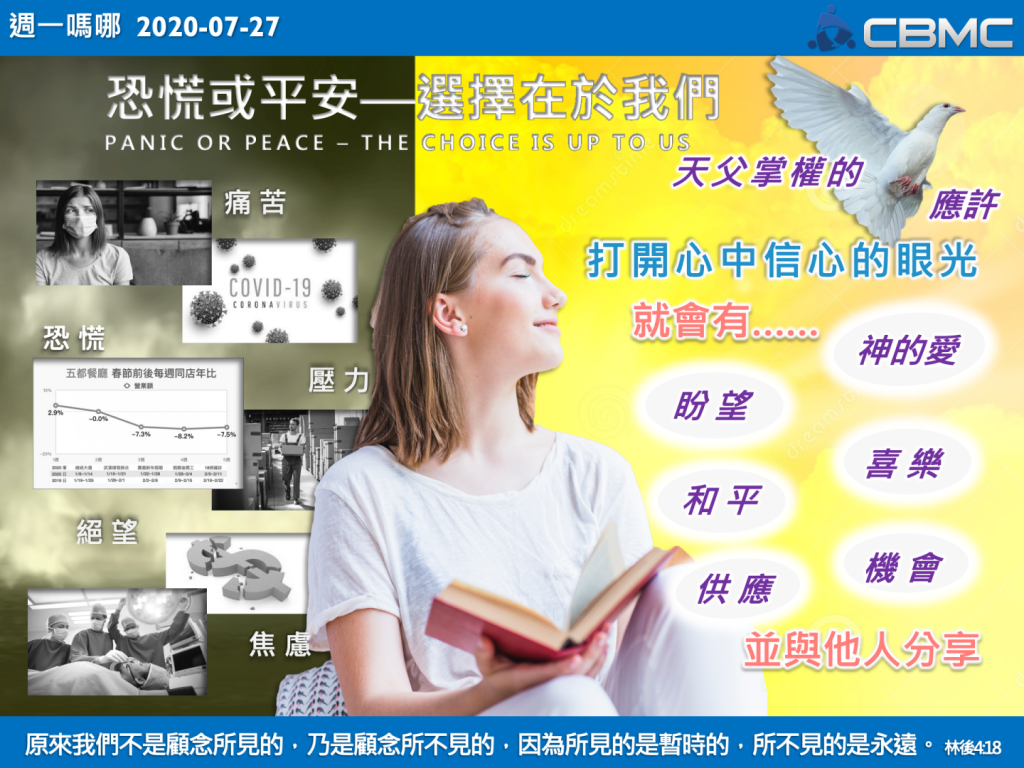恐慌或平安—選擇在於我們──PANIC OR PEACE – THE CHOICE IS UP TO US
我們的所見決定我們的所為。我們的所見往往也左右了我們的所感。
今年年初以來,我們經歷了前所未有、極為動蕩的情況。如果你目擊嚴重的健康、經濟和政治問題,可能會感到焦慮、退縮、希望重拾掌控權,或正在尋找治療痛苦的方法。
無數的新聞報導都在高呼:「天塌了!天塌了!」,我們漸漸開始認為他們也許是對的。被憂鬱和厄運的訊息轟炸後,我們開始認為這世界很複雜,而且充滿無法解決的問題,並開始以同樣的方式看待自己的生活。
但,這不是我們唯一的選擇。還有一種選擇,就是透過信靠以及堅定不移的信心來看待這個世界,以及我們的生命。正如哥林多後書5章7節所力勸我們的:「因我們行事為人是憑著信心,不是憑著眼見。」
如果我們相信並倚靠上帝,我們的天父是掌權的。即便當我們周圍的一切似乎都處於極大的混亂時,祂也能用完美的計劃完全控制一切,因此,我們就會用不一樣的眼光看待現在遇到的挑戰。我們可以把它們看作是機會,是那從信心中所成長出來,並和他人分享神的愛、盼望、喜樂、和平與供應的一種化了妝的機會。
今年的上半年是痛苦的,充滿了壓力、焦慮,我們當中的某些人有實質的損失。我們如何能不只是看見周遭壓迫而來的黑暗與絕望?正如我和許多我認識的人發現的,痛苦是一位偉大的老師,也許是我們一生中最偉大的老師。
事實是,除非有明顯的痛苦,否則人們往往不會改變。人們必須被強迫,通常經歷許多掙扎後,才能踏出他們熟知的舒適圈。然後,他們才會明白自己過去就像是押錯了賭注。了解這件事後,他們開始願意考慮改變。
你知道有誰對最近的事情焦慮不已,或是被無所不在的恐慌和歇斯底里困住了嗎?如果你只看到似乎無法解決的困惑與難題,這個人就是你。如果你在這樣的景況中,你要把目光投往不同的方向。「原來我們不是顧念所見的,乃是顧念所不見的;因為所見的是暫時的,所不見的是永遠的。」(哥林多後書4章18節)
如果你成功地超越問題並專注於神的應許時,那就是你與他人分享這一切的最佳時機。尋找機會向人提出問題並加深與他們的關係,無論對象是朋友、同事、甚至是老闆,因為好多人都很恐懼。沒有信心,他們就無法看到困難可能產生的好處。
永遠記住一點:上帝不會白白讓人受苦。我們現在身處的環境,正是告訴他人神會改變我們生命的真理的獨特機會。上帝的工作是將光明照入黑暗。我們的工作則是成為祂的代言人,傳遞祂永恆信息的大使。我們無法作上帝的工,而神也不會代替我們完成我們所該做的。
Ken Korkow居住在美國內布拉斯加州的奧馬哈市,他擔任該地的CBMC區域總監。本篇文章改編自他的「生活傳真」專欄。經許可使用。
反省與問題討論
- 你如何處理新冠病毒所帶來的影響?你是否被恐懼或焦慮所壓制了?面對各項限制,你的工作或事業是否受到了損害?你甚至懷疑事業是否還能支撐下去嗎?
- 透過信心的眼光,而非依照每天看到或聽到無所不在的壞消息看待世界、生命和環境,是什麼意思?
- 文章中引用了一段聖經經文:「原來我們不是顧念所見的,乃是顧念所不見的。」你認為這是甚麼意思?你對這樣的提醒做何反應?
- 你是否有機會和不同信仰的人交談?如果有,他們的反應是什麼?現今的不確定性和嚴峻的現實,是否使人們更願意思考屬靈的真理?
備註:如果你手上有聖經,想閱讀更多相關經文,請參考(因經文篇幅較長,請參閱未列出的經文詩篇118:13-14、馬太福音6:13-16):
詩篇23篇1-6節
23:1 耶和華是我的牧者,我必不致缺乏。
23:2 他使我躺臥在青草地上,領我在可安歇的水邊。
23:3 他使我的靈魂甦醒,為自己的名引導我走義路。
23:4 我雖然行過死蔭的幽谷,也不怕遭害,因為你與我同在;你的杖,你的竿,都安慰我。
23:5 在我敵人面前,你為我擺設筵席;你用油膏了我的頭,使我的福杯滿溢。
23:6 我一生一世必有恩惠慈愛隨著我;我且要住在耶和華的殿中,直到永遠。
詩篇27篇1-5節
27:1 耶和華是我的亮光,是我的拯救,我還怕誰呢?耶和華是我性命的保障(或譯:力量),我還懼誰呢?
27:2 那作惡的就是我的仇敵,前來吃我肉的時候就絆跌仆倒。
27:3 雖有軍兵安營攻擊我,我的心也不害怕;雖然興起刀兵攻擊我,我必仍舊安穩。
27:4 有一件事,我曾求耶和華,我仍要尋求:就是一生一世住在耶和華的殿中,瞻仰他的榮美,在他的殿裏求問。
27:5 因為我遭遇患難,他必暗暗地保守我;在他亭子裏,把我藏在他帳幕的隱密處,將我高舉在磐石上。
詩篇46篇1-3節
46:1 神是我們的避難所,是我們的力量,是我們在患難中隨時的幫助。
46:2 所以,地雖改變,山雖搖動到海心,
46:3 其中的水雖匉訇翻騰,山雖因海漲而戰抖,我們也不害怕。(細拉)
以賽亞書41章10節
41:10 你不要害怕,因為我與你同在;不要驚惶,因為我是你的 神。我必堅固你,我必幫助你;我必用我公義的右手扶持你。
哥林多後書5章16節
5:16 所以,我們從今以後,不憑著外貌(原文是肉體;本節同)認人了。雖然憑著外貌認過基督,如今卻不再這樣認他了。
哥林多後書6章2節
6:2 因為他說:「在悅納的時候,我應允了你;在拯救的日子,我搭救了你。」看哪,現在正是悅納的時候!現在正是拯救的日子;

PANIC OR PEACE – THE CHOICE IS UP TO US
By Ken Korkow
What we see determines what we do. What we see also tends to dictate how we feel.
Since the start of the year, we have lived through unprecedented, extremely turbulent circumstances. If you have seen times of great physical, economic and political problems, you likely have become anxious, withdrawn, controlling, and perhaps looking for ways to medicate your pain.
After relentless news reports that essentially insist, “The sky is falling! The sky is falling!” we start to think maybe they are right. Bombarded with messages of gloom and doom, we start to see a world of complex, unsolvable problems – and begin to see our own lives in much the same way.
That, however, is not our only option. There is also the option of seeing the world – and our lives in general – through the eyes of trusting, unwavering faith. As 2 Corinthians 5:7 admonishes, “for we walk by faith, not by sight.”
As a result, if we believe and trust that God, our heavenly Father is sovereign, completely in control with a perfect plan – even when everything around us seems to be in absolute chaos – we will then see these present challenges very differently. We can see them as opportunities, camouflaged opportunities to grow in faith and to share His love, hope, joy, peace and resources with others.
But these times have been painful, filled with stress, anxiety, and for some of us, genuine loss. How can we help but see the darkness and despair that seems pressed all around us? Because, as I and many people I know have discovered, pain is a great teacher – possibly the greatest teacher we can have in life.
The reality is, people tend not to change unless there is significant pain. They have to be forced, often after much resistance, out of their comfort with the known and familiar. When that happens, they can come to a revelation that they have been betting on the wrong horse, so to speak. Once they understand that, they become willing to consider change.
Who do you know that is stressing out over current events, who has become ensnared by the pervasive panic and hysteria? Perhaps this describes you, if all you can see are the perplexing problems that seem beyond solving. If that is the case, you need to shift where you are looking. “While we look not at things which are seen, but at the things which are not seen; for the things which are seen are temporal, but the things which are not seen are eternal” (2 Corinthians 4:18).
And if you have succeeded in looking past the problems and focusing instead on God’s promises, this is the perfect time to share them with others. Look for opportunities to ask questions and go deeper in relationships with people – friends, coworkers, even your boss – because so many people are fearful. Without faith, they cannot begin to see how good can possibly arise out of hard times.
Remember this: God does not waste pain. And given the circumstances we have all been in, we have unique opportunities to tell others about His truth that changes our lives. There is God’s part, to bring light into the darkness. And we have our part, to be His representatives, His ambassadors for communicating His eternal message. We cannot do God’s part. And the Lord will not do ours.
Ken Korkow lives in Omaha, Nebraska, U.S.A., where he serves as an area director for CBMC. This is adapted from his “Fax of Life” column. Used with permission.
Reflection/Discussion Questions
- How have you handled the circumstances surrounding COVID-19, the coronavirus? Have you found yourself overcome by fear or anxiety? Has your job or business suffered during as the many restrictions were put in place? Have you wondered how you could possibly survive?
- What does it mean to see the world, your life, the circumstances around you, through the eyes of faith rather than perceiving them in light of the pervasive bad news we have seen and heard almost every day?
- One of the Bible verses cited above says we are to look not at things that are seen, but things that are not seen. What do you think that means? How do you react to such an admonition?
- Have you had any opportunities to talk with anyone who did not share the same faith that you had? If so, what has been their response? Have you found people more responsive to considering spiritual truth, given the uncertainties and grim realities of our times?
NOTE: If you have a Bible and would like to read more, consider the following passages:
Psalm 23:1-6, 27:1-5, 46:1-3, 118:13-14; Isaiah 41:10; Matthew 6:13-16; 2 Corinthians 5:16-6:2


